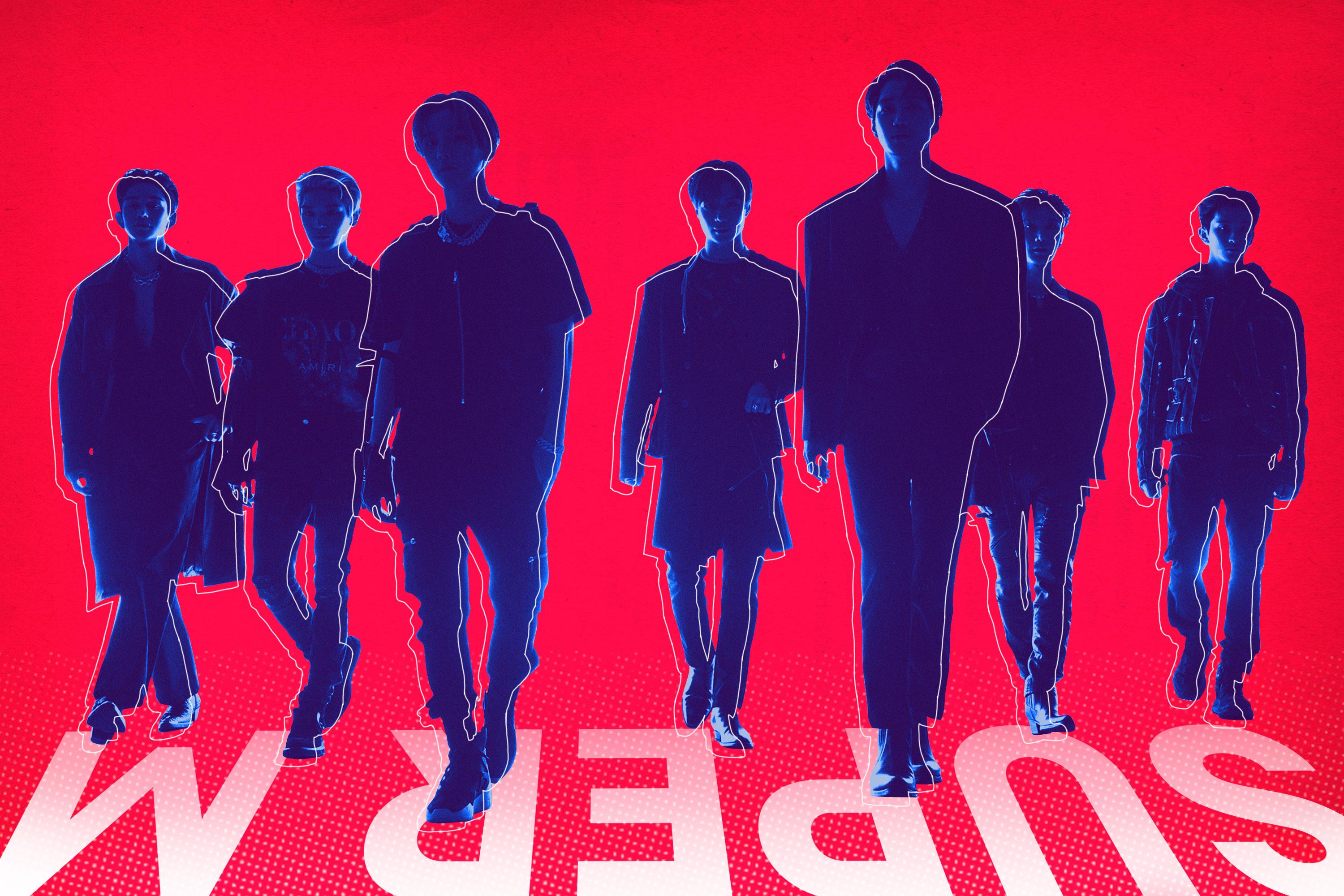
The days of considering K-pop fandom in America a short-lived trend are seemingly behind us; U.S. brands and K-pop entertainment companies have both begun focusing on an ever-growing Western fan base. But catering to a vocal, deeply passionate cadre of fans may be easier said than done. Two recent attempts to feed U.S. demand were met with immediate backlash—as is the case any time various K-pop fandoms are pitted against each other. Try to create a K-pop category for the MTV Video Music Awards? How dare you! Combine some of the most popular K-pop idols into a megatalented supergroup that will tour the U.S.? The nerve! It makes you wonder: Can anyone please all K-pop fans, or should everyone just stop trying? After all, hell hath no fury like a K-pop fan with a hashtag.
The first offense came when MTV announced on July 23 that they had added a “Best K-Pop” VMA category, including nominations for uber-popular groups BTS, Blackpink, EXO, Monsta X, NCT 127, and TXT. Backlash was immediate and expansive. Tamar Herman wrote for Forbes that the addition of a K-pop category was “too little, too late,” and that Western award shows should have begun recognizing revolutionary K-pop groups years ago. Also, the category seemed to be an attempt to preclude BTS’s inclusion in other categories like “Best Pop” or “Best Video.”
BTS fans who bristled in reaction to the MTV announcement were, in turn, relieved to see their boys announce an official (temporary!) hiatus, as the group has gone on an extended break instead of attending the VMAs and other events in the next few months. It’s looking like other K-pop groups will not attend the VMAs either; fans of Blackpink, EXO, NCT 127, Monsta X, and TXT were no less angry about the addition of the genre-specific category, in part because BTS will almost certainly win.
The VMAs announcement was just the beginning of a frustrating summer for many NCT and EXO fans. Despite the fact that both groups are owned by K-pop powerhouse SM Entertainment, EXO-Ls (fans of EXO) and NCTzens (fans of NCT) don’t overlap nearly as much as the casual observer might think—in fact, they’re often in direct opposition. So on August 8, when SM Entertainment announced the formation of a new “K-pop supergroup” that would combine talent from EXO, NCT, Chinese NCT spinoff WayV, and legacy SM group SHINee, a significant and outspoken portion of the online K-pop community was immediately against the idea.
At first, it was hard to imagine why. Introduced as the “Avengers of K-pop,” the group—dubbed SuperM, as a nod to the SM brand—features an objectively stacked lineup of the best performers in K-pop. Dance phenom Taemin of SHINee is the likely leader, having been an idol for over 11 years and a successful solo artist in his own right. Joining him are Kai and Baekhyun, two of EXO’s most popular members (and candidates for K-pop’s best dancer and vocalist, respectively); Taeyong and Canadian Korean Mark, the young and talented frontmen of NCT 127; Lucas, an NCT alum and rapper for Chinese subunit WayV; and Ten, a Thai member of NCT and WayV, who—from dance ability and vocals to multilingual fluency—is the dark horse for group MVP. Ten and Mark are fluent in English, and odds are they will be integral to the group’s efforts to promote in America.
There’s a clear focus on performers with outstanding stage presence in SuperM, to the point that one Twitter user joked that standing in the back of the group may be a new experience for everyone involved. And the variety of multicultural members is no coincidence either—recruiting stars outside of Korea is becoming more and more common within the K-pop genre. SM is already playing into high expectations, releasing early sneak peeks of SuperM dance practice and pictures of the stars training.
As good as all this looks, there are potential downsides to the venture. First, SuperM will focus on the U.S. market by way of Capitol Records, and they will debut in America right off the bat, rather than starting with Korean promotions. It’s a noteworthy strategy that could break new ground for K-pop’s global development, but it left some fans feeling that SM was ignoring the Asian fan base that had supported these members since their various debuts. The main question for SM, as asked by Caitlin Kelley for MTV News, boils down to: “Why spend resources on SuperM when you could invest time in your established groups?” So yes, fans are pissed—and no one gets pissed quite like K-pop Twitter. Within hours of the SuperM announcement, #SuperMDisbandParty was trending nationwide, accompanied by the usual interfandom bickering and “fancam” videos (amateur concert-video clips focused on a specific performer). From inserting fancams into unrelated discussions to jumping on hashtags like #___isgoingtojailparty, K-pop fans have a knack for rallying in disconcertingly mob-like fashion on social media.
While some of these concerns are founded, the timing of the SuperM announcement makes sense for SM on a number of levels, primarily because other members of EXO and SHINee are currently serving their mandatory Korean military enlistment. Neither group will be whole for several years, so now is the perfect time to give the nonenlisted members their own projects in the interim. As for the members from NCT and WayV, they’ve been part of SM’s ever-changing Neo-Culture Technology experiment since their debut—at the end of the day, this is just one more subunit, albeit on steroids.
Once fans do recognize and support SuperM, the question will be whether it will be enough to rival BTS in the U.S. market. Ultimately, that has to be the goal, and that’s why SuperM’s “Avengers of K-pop” mantle has stuck with me. In theory, yes, the Avengers comparison serves as a basic analogy to explain how the various members have been curated from SM’s many groups. SM A&R executive Chris Lee told Billboard, “We keep describing them as ‘Avengers’ because I think that’s the best conceptual analogy that will immediately be understood by others. Each Avenger has their own group, and Iron Man has his own movie ... but together they have an even greater synergy.”
However, when you think about SuperM as a group that has, ostensibly, been assembled to rival BTS, they start to seem more like another superhero team: the Justice League. BTS represents the MCU of K-pop: a seemingly unbeatable, surreally popular force that crushes records with no sign of slowing down. They rely on their charming members, messages of self-empowerment, and family-friendly image to fill seats and turn fan loyalty into industry domination. Just like the Avengers’ Captain America, BTS leader RM has an appeal that lies as much in inspirational speeches and endearing dad energy as anything else, and as a result, he and his group are the recipients of a level of fandom the world has struggled to grasp. As Thanos might say, BTS is inevitable.
Comparatively, SuperM is SM’s equivalent of the DC Universe—an attempt to create a darker, sexier, and cooler franchise that will catch the attention of fans who want something a little different. They’re made of individual members who are considered the hottest and most popular of their respective groups, many of whom have already seen success in the solo world. But a megatalented team wasn’t enough to guarantee success for DC, or to push them past the MCU, and it remains to be seen whether it will be enough for SuperM.
It looks like SM’s assumption is that current fans of each SuperM member will follow them anywhere, and that the group’s performers are compelling enough to silence naysayers. But the idea that individual members’ fans will ultimately support the group at large may not be such a given.
Boy bands have always been synonymous with uncompromising fans and inescapable rivalries, both within K-pop and across the world. Often there’s a clear winner, as with the Beatles versus the Monkees, or One Direction versus (checks notes) … The Wanted? And sometimes, like with ’NSync and the Backstreet Boys, there’s no obvious answer, and the debate continues to rage for decades beyond their prime. Even in the early days of K-pop, H.O.T was pitted against Sechskies, and TVXQ vs. SS501. So it’s no surprise that many current K-pop fans have staked their loyalties to one group, and one group alone—it’s how it’s always been. But at what point does single-minded loyalty and commitment to one group come at the cost of K-pop’s growth as a genre?
By now, the power of the BTS “Army” is known (and feared) across the pop culture world, and EXO-Ls, NCTzens, and Blackpink’s “Blinks” have also shown their strength in numbers over the past few months. K-pop fans are certainly not alone in their tendency to fiercely express online anger—the Beyhive is just as wrathful, and anyone who’s spoken ill of Taylor Swift or Ariana Grande knows how quickly their fan bases can mobilize on Twitter. But with their fancams, organized hashtags, and ever-increasing ranks—not to mention projects like organizing fundraisers or decorating airplanes for their favorite idols—K-pop fans are taking stan culture to previously unseen levels.
Part of this stems from the nonstop fan service that K-pop companies tend to provide. Just look at BTS—they may technically be on a brief hiatus, but fans have no time to catch their breath between a BTS concert movie in theaters, a forthcoming docuseries, a weekly variety show, constant social media updates, new solo music releases, and a BTS mobile game. It’s no wonder that fans feel so protective of their favorite groups—stanning at this level requires a singular kind of dedication.
Fan service also tends to reward those who have years of prior experience and background knowledge of a group, and SuperM is already playing into those techniques. Another teaser video, dropped this week, seems designed to excite NCT fans who missed seeing Mark and Taeyong interact with Lucas and Ten, their old NCT U groupmates. But the Twitter replies are still filled with EXO-Ls and NCTzens who have edited the video to only feature their favorite idols.
Experiments like the VMAs’ K-pop category and the SuperM announcement once again prove how online backlash is inevitable, and often overwhelming, when it comes to navigating multiple K-pop fandoms at once. BTS’s parent company, Big Hit Entertainment, hasn’t quite been drawn into the fire yet, but it may happen soon enough, given their recent ventures. The label announced this week that upcoming Big Hit projects will include a new girl group, another BTS interactive game, and a TV drama based on the “BTS Universe.” Big Hit may be smart to keep their content primarily focused on BTS for the time being—lord knows most of their fans don’t want anything else. But in the world beyond BTS, SM and MTV certainly aren’t wrong to cater to the multigroup fans out there—plenty of people support several groups within the K-pop genre at large, and it makes sense to target them whenever possible. It’s why collaborative concerts like SM’s multigroup festival SMTown and KCON, the U.S.’s biggest Hallyu convention, are repeatedly successful. But the toxic side of fandom is difficult to escape, even within those spaces—and when the angriest fans are consistently the loudest voices in the room, the growing pains of K-pop’s expansion in the West become increasingly difficult to manage.
So much of the rising K-pop wave is unprecedented—the reality is that BTS’s success may not be replicable by any group, no matter how charming or talented. The backlash against BTS’s inclusion in the VMAs K-pop category just goes to show how, according to their fans, BTS may have transcended the genre altogether. But to the rest of the world, BTS and K-pop have nearly become synonymous entities, and it’s up to groups like SuperM to expand U.S. definitions of K-pop beyond BTS’s all-consuming impact.
That will be a near impossible task unless fans come together to support SuperM despite their individual loyalties—but I think SM can wear them down. And if fans are determined only to support their favorite idols, then maybe SuperM can create enough new American K-pop fans to make up the difference. SuperM posters are already lining the streets of Los Angeles, and the first stops of their U.S. debut will soon follow. Whether or not SuperM is a success, and even if the VMAs K-pop category comes and goes midcommercial break, both signify a rising tide in Western K-pop demand. It may only be a matter of time until one of these experiments pays off—backlash be damned—and the West starts to recognize K-pop as the ever-evolving, ever-entertaining genre it really is. But in the meantime, K-pop companies, media groups, and casual observers alike—maybe keep those Twitter DMs safely closed.

